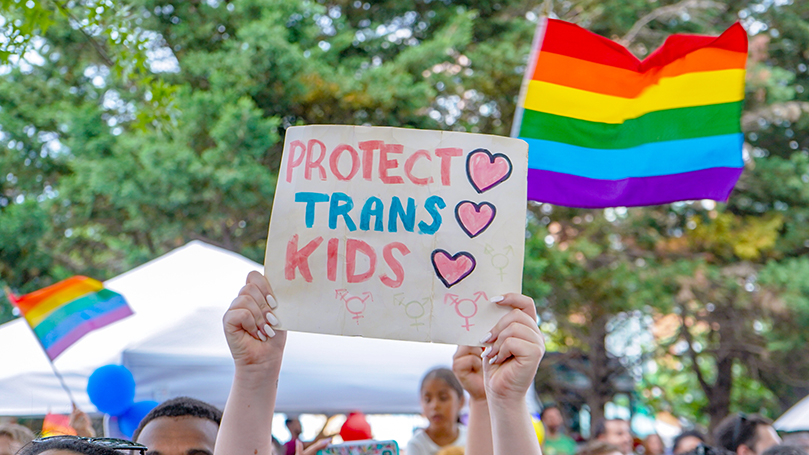
Content warning: discussion of policies targeting gender-diverse people, discussion of sex and reproduction.
Virginia’s Education Department released the 2023 Model Policies on Ensuring Privacy, Dignity, and Respect for All Students and Parents in July, which withdrew and replaced the 2021 Model Policies for the Treatment of Transgender Students in Virginia’s Public Schools.
In this policy, the Department of Education dictates that a student’s parents must approve in writing any counseling, names, nicknames, and pronouns for the student. It also states that a student’s parents can require that the student use single-person bathrooms and locker rooms.
They also define their terms, including these two that violate observations of the natural world:
- “The word ‘sex’ means biological sex”
- “The phrase ‘transgender student’ shall mean a public school student whose parent has stated in writing that the student’s gender differs from the student’s sex, or an eligible student who states in writing that his or her gender differs from his or her sex.”
These policies are so dissociated from reality that I couldn’t take them seriously as a scientist, and I found myself unable to engage with these absurd policies intellectually.
I originally sat down to write an article about the science behind trans and gender-diverse people and the common right-wing arguments against their freedom and peaceful existence. Instead, I hope this summary of basic observations of the natural world conveys the ridiculous and inhumane nature of these policies.
How these definitions defy the observable universe
What is biological sex?
There is no single variable that defines a person’s sex. Rather, there are many. Even when we restrict our discussion to only the most common examples of sex-related variables, we see that no definition of “biological sex” can be reduced to a strict binary.
One of the most commonly understood sex-related variables are genitalia. At birth, most humans have either external labia (lips, or invaginations of the body which often connect to a muscular canal which leads from the outside of the body to a cervix) or an external penis (an organ that protrudes from the pubic arch and usually contains a urethra). Many of those born with an external penis also have visible testicles. However, many humans are born without clearly fitting one of these two options. For example, both can be present, or people can have closed labia, fused labia with testicular lumps, lack of testicles, undescended testicles, or other differences.
Chromosomes are another well-known variable. Most people have two sex chromosomes. People identified as female at birth usually have XX chromosomes, and those identified male at birth typically have XY chromosomes, with the Y chromosome containing genes that tell the gonad to grow into a testis rather than an ovary, although other factors are also at work here. However, many people are born with other variations. For example, one out of 500 people have XXY chromosomes, one out of 2,500 have just a single X, one out of a thousand are XYY, and another one out of a thousand have XXX. Many people with these less commonly occurring variations do not learn about their own chromosomal makeup until puberty or until they try to get pregnant later in life.
A third famous factor are hormones. So-called “sex hormones,” including testosterone, estrogens, progesterone, and many more, are key components to one or more of these processes: as fetuses develop genitals, as young people go through puberty, and during birth. But, nearly all hormones have additional roles in the body.
There is no such thing as a male hormone or a female hormone. Ovaries produce estrogen and progesterone as well as testosterone. Testes (and other tissues) produce testosterone as well as estrogens. Progesterone can be produced by the adrenal glands, ovaries, and testes, as well as the ovarian corpus luteum and placenta during most pregnancies. Progesterone is a hormone that the body uses to make other hormones like cortisol and testosterone, and it also affects the expression of other genes in your body, and can influence spermiogenesis, testosterone biosynthesis, erections, bone density, stress responses, and organ function. Many people take testosterone-blockers for Polycystic Ovary Syndrome (PCOS), or progesterone for menopause.
As a result of these and other interacting variables, some people’s bodies do not conform to a simple male-or-female binary.
For example, there is XY female syndrome, also called Swyer syndrome, which is when people are born with XY chromosomes and a functional vagina, uterus, and fallopian tubes, but usually lacking ovaries. These people will not go through puberty without being provided with additional estrogen or testosterone.
There is also XX male syndrome, also called de la Chapelle syndrome, which is when people have XX chromosomes as well as a penis and testes, though most do not have sperm that can fertilize an egg. Often, but not always, these people will go through puberty without any additional hormone treatment.
But what about gender?
First, what is gender? This is a huge topic! In brief, gender identity generally refers to how someone views themselves in relation to other people. Gender expression is how a person expresses their gender identity to others. When the Declaration of Independence was signed, the white, wealthy Youngkin’s of the time would have worn makeup, tights, and high heels. Now, Youngkin verbally attacks men who do the same. What constitutes gender expression is plastic and changes over time and across societies, highlighting just how much these so-called definitions are constantly changing and dependent on the people around us, not something at all related to a person’s “biology.” While most of us in the U.S. experience enforced binary categories of male and female, this is not an adequate description of sex nor gender.

Even if Youngkin’s Department of Education (DOE) required an MRI, chromosome analysis, and blood test for sex hormones for each child, we would never be able to classify all students’ “biological sex.” Sex is not a single variable that we can define for an individual. How then can we decide if someone’s gender identity or expression matches their sex? In short, we cannot.
I have limited the discussion to just three variables of many. Most of us can think of people we know who check off all the boxes of either “male” or “female” based on the categories listed here, yet still struggle to produce a child with their partner, or have disruptions in menstruation, erections, or puberty. Many of us know people who need additional hormones to get pregnant or during menopause, or who need pills to have an erection. We all know this, but Youngkin’s DOE, and right-wingers across the country, are asking us to ignore basic observations of the world around us.
While no human being can or should be compared to non-human animals, I would be remiss not to mention that sex determination is even more interesting across different species, including Tanzanian Spotted Hyenas, Brazilian smoky jungle frogs, Platypuses, Lysmata shrimp, and Moon wrasses!
Countless interesting modes of sexual reproduction and development can also be found in nature, like ZW chromosomes, Alpha and A types, and temperature-dependent sex determination. It’s a shame we have to spend any time thinking about these harmful, reactionary policies rather than talking about the diversity of life on this beautiful planet.
But until we are all free, none of us are free.
What can you do to help now?
- Educate yourself on trans issues and why inclusive language matters! CATS is a great place to start.
- Donate money and time: Dirty South Trans Radicals is a group based in Virginia that organizes mutual aid for trans folks in need. Equality Virginia also has a list of groups that help trans folks at all levels.
- See the Special Oppression and Exploitation, Additional Forces for Social Progress, and Unity Against the Extreme Right sections of the CPUSA Program to learn more about why Communists oppose this policy.
- Oppose anti-trans laws in your area, and support laws that support trans comrades. Check the legislation in your local area here. Actions under this category include: writing or calling your representatives, attending a hearing, attending marches and events, or supporting bail or lawyer funds for anyone arrested during protests, or for those disobeying unethical laws.
- 2024 is a big voting year: only support candidates that support trans and non-binary folks. Ask your candidates their views if they haven’t expressed them openly.



